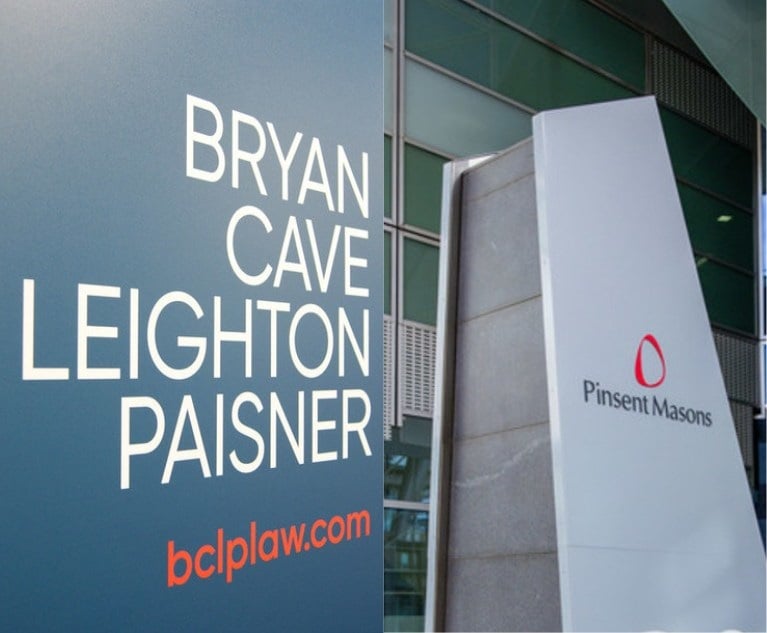CC report reveals rising partner pro bono efforts and 2010-11 finances
Clifford Chance's (CC) partners increased their pro bono contributions by 31% last year, with the firm as a whole investing hours valued at a total of £17.8m in pro bono work during 2010-11. The figures are contained within CC's annual corporate responsibility report, which states that the magic circle firm invested a total of 58,368 hours in pro bono and community activities during the year, up 2% from the figure of 57,071 hours reported last year.
October 07, 2011 at 11:41 AM
3 minute read
Clifford Chance's (CC) partners increased their pro bono contributions by 31% last year, with the firm as a whole investing hours valued at a total of £17.8m in pro bono work during 2010-11.
The figures are contained within CC's annual corporate responsibility report, which states that the magic circle firm invested a total of 58,368 hours in pro bono and community activities during the year, up 2% from the figure of 57,071 hours reported last year.
The report also states that the average number of pro bono hours recorded by all partners was 12 – a figure the firm claims marks a 31% increase on the hours partners contributed during 2009-10.
The report also provides a breakdown of diversity statistics at the firm, offering an indication of the gradual progress being made on female promotions and ethnic diversity within its lawyer and support staff ranks.
CC has stated a long-term intention to reach 30% female representation in its partnership, and last year matched this target with women comprising 30% of the firm's 2011 partner promotions.
However, the overall proportion of female partners at the firm remained static at 14.5%, although representation among its lawyer ranks rose marginally from 48% to 49%.
Meanwhile, the percentage of London partners self-reporting as coming from an ethnic minority increased from 2.6% to 5.4%.
CC last year became one of the first firms to place a value on its aggregated pro bono efforts, when it reported 2009-10 pro bono hours worth an equivalent of £17m in billable hours.
The magic circle firm's accounts for 2010-11 also show that staff costs rose marginally from £535m to £537m over the year, while other operating costs decreased from £327m to £300m.
During 2010-11 the firm also improved its cash position by £44.4m to £64.5m, paid off a bank borrowing facility of £92m, and renegotiated a new bank facility which is due to expire in 2016.
In addition, CC stated that it had used up the £25.7m fund it set up at the end of 2003 as a reserve for exceptional costs. The majority of this fund was used to pay for the firm's extensive restructuring during the financial downturn which saw it reduce its global partnership by 15%.
A spokesperson said: "Following the introduction of new accounting rules, the firm changed its accounting policy at the end of the 2003 financial year. This created a one-off gain that was credited to a reserve. Over the intervening period, this reserve has been used to help fund certain exceptional costs e.g. the restructuring of the firm's partnership. At the time of the restructuring, we explained that our reserves would be deployed in this way. This reserve has now all been spent."
The spokesperson added: "The firm's robust financial position has enabled us to successfully negotiate new borrowing facilities. These will run till 2016."
This content has been archived. It is available through our partners, LexisNexis® and Bloomberg Law.
To view this content, please continue to their sites.
Not a Lexis Subscriber?
Subscribe Now
Not a Bloomberg Law Subscriber?
Subscribe Now
NOT FOR REPRINT
© 2025 ALM Global, LLC, All Rights Reserved. Request academic re-use from www.copyright.com. All other uses, submit a request to [email protected]. For more information visit Asset & Logo Licensing.
You Might Like
View All
A&O Shearman, Cleary Gottlieb Act on $700M Dunlop Tire Brand Sale to Japan's Sumitomo


Stewarts and DAC Beachcroft Lead on £2B Leicester City Helicopter Crash Litigation

Israel's Rushed Corporate Tax May Spark Law Firm Mergers, Boost Large Firms Including Gornitzky
4 minute readTrending Stories
- 1Meta Pulls Plug on DEI Programs
- 2On the Move and After Hours: Meyner and Landis; Cooper Levenson; Ogletree Deakins; Saiber
- 3State Budget Proposal Includes More Money for Courts—for Now
- 4$5 Million Settlement Reached With Stone Academy
- 5$15K Family Vacation Turned 'Colossal Nightmare': Lawsuit Filed Against Vail Ski Resorts
Who Got The Work
Michael G. Bongiorno, Andrew Scott Dulberg and Elizabeth E. Driscoll from Wilmer Cutler Pickering Hale and Dorr have stepped in to represent Symbotic Inc., an A.I.-enabled technology platform that focuses on increasing supply chain efficiency, and other defendants in a pending shareholder derivative lawsuit. The case, filed Oct. 2 in Massachusetts District Court by the Brown Law Firm on behalf of Stephen Austen, accuses certain officers and directors of misleading investors in regard to Symbotic's potential for margin growth by failing to disclose that the company was not equipped to timely deploy its systems or manage expenses through project delays. The case, assigned to U.S. District Judge Nathaniel M. Gorton, is 1:24-cv-12522, Austen v. Cohen et al.
Who Got The Work
Edmund Polubinski and Marie Killmond of Davis Polk & Wardwell have entered appearances for data platform software development company MongoDB and other defendants in a pending shareholder derivative lawsuit. The action, filed Oct. 7 in New York Southern District Court by the Brown Law Firm, accuses the company's directors and/or officers of falsely expressing confidence in the company’s restructuring of its sales incentive plan and downplaying the severity of decreases in its upfront commitments. The case is 1:24-cv-07594, Roy v. Ittycheria et al.
Who Got The Work
Amy O. Bruchs and Kurt F. Ellison of Michael Best & Friedrich have entered appearances for Epic Systems Corp. in a pending employment discrimination lawsuit. The suit was filed Sept. 7 in Wisconsin Western District Court by Levine Eisberner LLC and Siri & Glimstad on behalf of a project manager who claims that he was wrongfully terminated after applying for a religious exemption to the defendant's COVID-19 vaccine mandate. The case, assigned to U.S. Magistrate Judge Anita Marie Boor, is 3:24-cv-00630, Secker, Nathan v. Epic Systems Corporation.
Who Got The Work
David X. Sullivan, Thomas J. Finn and Gregory A. Hall from McCarter & English have entered appearances for Sunrun Installation Services in a pending civil rights lawsuit. The complaint was filed Sept. 4 in Connecticut District Court by attorney Robert M. Berke on behalf of former employee George Edward Steins, who was arrested and charged with employing an unregistered home improvement salesperson. The complaint alleges that had Sunrun informed the Connecticut Department of Consumer Protection that the plaintiff's employment had ended in 2017 and that he no longer held Sunrun's home improvement contractor license, he would not have been hit with charges, which were dismissed in May 2024. The case, assigned to U.S. District Judge Jeffrey A. Meyer, is 3:24-cv-01423, Steins v. Sunrun, Inc. et al.
Who Got The Work
Greenberg Traurig shareholder Joshua L. Raskin has entered an appearance for boohoo.com UK Ltd. in a pending patent infringement lawsuit. The suit, filed Sept. 3 in Texas Eastern District Court by Rozier Hardt McDonough on behalf of Alto Dynamics, asserts five patents related to an online shopping platform. The case, assigned to U.S. District Judge Rodney Gilstrap, is 2:24-cv-00719, Alto Dynamics, LLC v. boohoo.com UK Limited.
Featured Firms
Law Offices of Gary Martin Hays & Associates, P.C.
(470) 294-1674
Law Offices of Mark E. Salomone
(857) 444-6468
Smith & Hassler
(713) 739-1250








